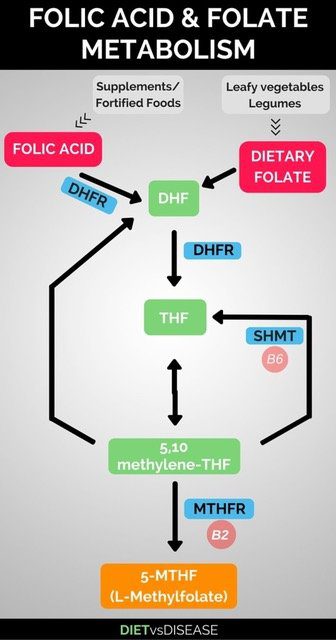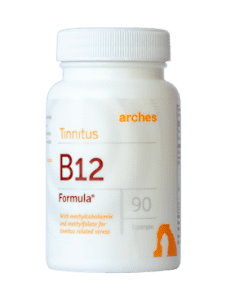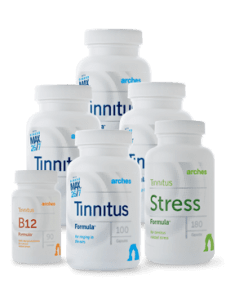By Barry Keate
Barry Keate, has lived with tinnitus over 40 years and has published 150+ research articles on numerous aspects of tinnitus. He is an expert on the condition and a well-known advocate for those with tinnitus.
Folic acid has long been considered an essential vitamin. It is shown to be helpful in preventing hearing loss with tinnitus, and it supports many aspects of a healthy metabolism. However, a common genetic mutation can prevent folic acid from being converted to a usable form, which can also cause serious health issues.
Now a newer and superior form of folic acid bypasses this conversion and delivers the vitamin directly to the body. Known as methylfolate, this improved form of folic acid is now part of our Arches Tinnitus B12 Formula.
The Benefits of Folic Acid
Folic acid (also known as vitamin B9) was identified in the 1930’s as the nutrient needed to prevent anemia and neural tube defects in the fetuses of pregnant women. Folate was first extracted from spinach leaves in 1941. In the 1990’s the US implemented the Folate Fortification Program that required food producers to add folic acid to cold cereals, breads, flour, pasta and bakery items.
Folic acid, along with vitamins B6 and B12, are necessary for the metabolism of homocysteine, which is a toxic amino acid found in high concentrations in meat and dairy products. Homocysteine damages the lining of the arteries. This allows cholesterol plaques to build up, developing into atherosclerosis, and is a significant marker for heart disease including heart attack, stroke and thrombosis from increased blood clots.
The Problem with Folic Acid

There is a problem with “standard” folic acid: it is a synthetic chemical and not suitable for direct use by the human body. It must first go through a three-stage metabolizing process where it is converted to methylfolate (5-MTHF). Even folate derived from diet, such as green, leafy vegetables, must go through this process. Methylfolate is then capable of being transported into the cells and can cross the blood-brain barrier leading to numerous health benefits. (continue reading below…)
Folic acid and folate (found in foods) are processed by a specific enzyme with a very long name. Methylenetetrahydrofolate reductase (MTHFR) is the enzyme that plays the largest role in the conversion and utilization of folates and is responsible for the final conversion to methylfolate.
Unfortunately, many people have a genetic variation in their MTHFR enzyme that slows or prevents this final conversion. One paper states that approximately 60% of the population in the United States have genetic variations that make them unable to utilize folic acid. (1)
For those with this genetic variation, not only do they not benefit from folic acid but unmetabolized folic acid circulates in the bloodstream. This can lead to many negative health effects.
According to the National Institutes of Health (NIH), about 35% of people in the US consume folic acid through dietary supplements and that people over the age of 50 have the highest folic acid intakes.
Researchers from Tuft University tested laboratory mice to determine whether folic acid could inflict unfavorable changes on the immune system, lowering our ability to fight cancer. They looked specifically at natural killer cells, which are a particular type of immune cell vital in defending against viral infections and cancer by attacking infected cells.
Results showed the mice that were fed high amounts of folic acid had higher concentrations of unmetabolized folic acid in the blood and had lowered natural killer cell activity. (2)
These results built on the findings of a study from 2005 conducted by the same lab, which found that 78% of healthy postmenopausal women had unmetabolized folic acid in the blood plasma, indicating excess folic acid. They, too, had lower natural killer cell activity.
Impairing the function of natural killer cells leads to increased vulnerability to disease. In the elderly, these cells are particularly important because the immune system diminishes with age, leaving them more open to infections and cancer.
Arches B12 Formula for Tinnitus and Related Stress

Arches has offered a B12 formula for tinnitus-related stress since 2002. The product initially contained a form of B12 called cyanocobalamin, which has to be converted to the form the body uses, methylcobalamin. When methylcobalamin became commercially available we changed to that superior ingredient. The product also contained folic acid. Based on this recent information, in May of 2018 we have upgraded the folic acid to methylfolate. Both methlyfolate and methylcobalmin are much more costly to produce, but well worth the benefits.
Deficient B12 levels have long been associated with tinnitus and supplementing with B12 has been shown to improve it.
The Numerous Benefits of Methylfolate
Several studies have linked low folate levels with increased hearing loss and by extension, tinnitus. One study examining Sudden Sensorineural Hearing Loss (SSHL) established that, “Folate levels were found to be significantly lower in SSHL patients than controls. And “A significant relationship was found between low folate levels and high homocysteine levels in all patients.” (3)
Another study from the Netherlands showed folic acid supplementation slows age-related hearing loss. (4)
Yet another study, presented at the 2009 American Academy of Otolaryngology, shows that higher folate levels decrease the risk of hearing loss in men over the age of 60 by 20%. (5)
At the beginning of this article we discussed homocysteine and the ability of folate to lower it. This leads to great improvement in cardiovascular health and prevents cardiac arrest and stroke. It also leads to improved blood circulation, which is supportive of hearing health.
Methylfolate is necessary for the synthesis of the neurotransmitters serotonin, dopamine and norepinephrine which makes it very effective for improving mood and reducing depression. One study showed patients with depression or schizophrenia had folate deficiencies. The patients given methylfolate had significant improvement compared to placebo and the difference increased over time. (6)
Methylfolate can help with Alzheimer’s disease and dementia. These patients are more likely to have reduced folate levels compared to healthy people. Methylfolate can improve symptoms in those patients. (7)
Many patients with Chronic Fatigue Syndrome and/or Fibromyalgia have inadequate folate metabolism. They may also have subclinical hypothyroidism that may be related to inadequate production of methylfolate, which is essential for the conversion of tyrosine to thyroid hormone. (8)
Low levels of methylfolate are implicated in increased risk of cardiovascular disease, stroke, dementia, depressions, cancers, and birth defects.
Arches Tinnitus Combo Pack

Arches Combo Pack™ contains a three-month supply of all our products at a significant discount from individual pricing. It includes Arches Tinnitus Formula® with our proprietary Ginkgo Max 26/7®, designed specifically for people with tinnitus. It also includes Arches Stress Formula®, a clinical dosage of all necessary B vitamins including Vitamin B6, required for metabolizing homocysteine. And it includes our improved Arches B12 Formula®, with active ingredients methylcobalamin and methylfolate.
Try Arches Tinnitus Combo Pack. Reduce your tinnitus, reduce tinnitus-related stress and improve your overall health.
References:
1 – http://www.methylpro.com/methylfolate-info.html.
2 – Sawaengsri H. et al. High Folic Acid Intake Reduces Natural Killer Cell Cytotoxicity in Aged Mice. Journal of Nutritional Biochemistry. 2015.12.006, Published 6 January 2016.
3 – Cadoni G, Agostino S, et al. Low Serium Folate Levels; a Risk Factor for Sudden Sensorineural Hearing Loss? Acta Oto-Laryngologica 2004, Vol. 124, No. 5. 608-611.
4 – Durga J, et al. Effects of Folic Acid Supplementation on Hearing in Older Adults: A Randomized, Controlled Trial. https://www.ncbi.nlm.nih.gov/pubmed/?term=folic+acid+supplementation+on+hearing+in+older+adults
5 – Shargarodsky J, Curhan G, et al. A Prospective Study of Vitamin Intake and the Risk of Hearing Loss in Men. Otolaryngology-Head Neck and Surgery, Vol. 142, No. 2, Feb 2010.
6 – Godfrey PS, et al. Enhancement of Recovery from Psychiatric illness by Methylfolate Lancet. 1990 Aug 18;336(8712):392-5.
7 – Hui Chen, et al. Folic Acid Supplementation Mitigates Alzheimer’s Disease by Reducing Inflammation: A Randomized Controlled Trial. Mediators of Inflammation, Volume 2016, Article ID 5912146.
8 – Kelly GS. Folates: Supplemental Forms and Therapeutic Applications. Alt Med Rev 1998. 3(3): p. 208-
